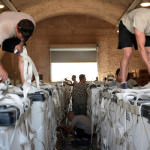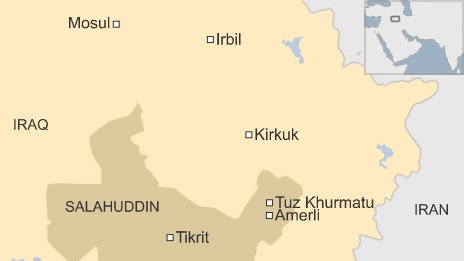Germany to arm Kurds
German defence minister Ursula von der Leyen announces the country will ship enough armour-piercing missiles, assault rifles and other military equipment to equip a 4,000-strong brigade of Kurdish fighters by the end of September. The weapons will be delivered in tranches and include 8,000 G36 assault rifles, the same number of G3 rifles, 30 Milan anti-tank missile systems equipped with 500 missiles, and five Dingo armoured cars as well as other arms and ammunition.
Not least because of the number of foreign fighters, it threatens our security in Germany and Europe.
Cargo plane comes under fire
ISIS militants fire on a Royal Australian Air Force Hercules C-130 cargo plane with small arms and heavy machineguns during an airdrop over the Shiite Turkmen town of Amerli in northern Iraq. With the drop taking place at night, the rebels fire by noise rather than sight as the darkened planes flew below 300 meters to make the delivery of 15 bundles of water, biscuits and hygiene packs. U.S. fighter jets flying top cover respond with maximum force after being guided in by a high-flying U.S. Air Force J-Star spy plane.
Northern town retaken
Iraqi Kurdish forces and armed Shia volunteers recapture the northern famring town of Sulaiman Bek, killing Mussab Mamoud, the ISIS leader in the town, and military wing commander Mazen Zaki along with more than 20 other fighters. General Abdul Amir al-Zaidi, head of the Dijala Operations command:
The town of Suleiman Bek has been liberated from Islamic State by the Iraqi Army and Peshmerga as well as local volunteers including the Peace Brigade, Badr Corps and Asaib Ahel-al-Haq
Australia to airlift weapons
The Royal Australian Air Force will deliver weapons to Kurdish fighters battling ISIS. Abbott says the decision to join Canada, Italy, the U.S., France and Britain is made to address a worsening ‘humanitarian crisis.’
Australia will join international partners to help the [anti-IS] forces in Iraq
The RAAF will provide C-130J Hercules and C-17A Globemaster aircraft. It has previously limited its air operations to humanitarian drops.
Starts airstrikes, aid drops in northern town
The U.S. begins airstrikes and humanitarian drops in the northern town of Amerli, backing up a combined local force of Iraqi military, Shiite militia and Kurdish peshmerga fighters that is seeking to break the ISIS siege of the town and free 15,000 trapped Shiite Turkmen. Australia, France and the UK also participate in the aid drop. Rear Admiral John Kirby says operations will be limited in scope and duration, as required to protect civilians trapped in Amerli.
Operation to free northern town
 The Iraqi Army, Shiite militias and Kurdish peshmerga launch operations to free the northern town of Amerli, where 15,000 minority Shia Turkmen have been under siege by ISIS for two months. The combined forces are reported to be mounting an assault on two fronts in the Salahuddin Kurdish area, with peshmerga fighters said to be west of Tuz Khurmatu, just north of Amerli, and Iraqi army units and Shia militia are approaching Amerli from the south. The Iraqi Air Force is providing some cover on the southern approach. The operation is reported to have two objectives: to break the siege of Amerli and to reopen the main highway leading north from Baghdad.
The Iraqi Army, Shiite militias and Kurdish peshmerga launch operations to free the northern town of Amerli, where 15,000 minority Shia Turkmen have been under siege by ISIS for two months. The combined forces are reported to be mounting an assault on two fronts in the Salahuddin Kurdish area, with peshmerga fighters said to be west of Tuz Khurmatu, just north of Amerli, and Iraqi army units and Shia militia are approaching Amerli from the south. The Iraqi Air Force is providing some cover on the southern approach. The operation is reported to have two objectives: to break the siege of Amerli and to reopen the main highway leading north from Baghdad.
Military options focus on Iraq
Obama says that while he has asked Defense Secretary Chuck Hagel and Joint Chiefs of Staff chairman General Martin Dempsey for ‘a range of options’ for confronting ISIS, military plans are currently limited to protecting U.S. personnel in Iraq and do not extend to action in Syria. To reporters:
Our core priority right now is just to make sure our folks are safe
Airstrikes kill 31 militants
Syrian fighter jets unleash more than two dozen airstrikes on the ISIS stronghold city of Raqqa, killing at least 31 militants and wounding dozens more. The Syrian Observatory for Human Rights says 26 strikes hit ISIS-controlled buildings, including the military court and bases in the city. Sources say that at least six civilians are killed and 10 injured in the bombing campaign, which has now lasted five days. Raqqa resident:
About 30 percent of the strikes hit the Islamic State positions, the rest hit civilian areas
Army retakes Lebanese town
The Lebanese military enters the border town of Arsal and redeploys in security checkpoints following the withdrawal of militants affiliated with ISIS and Al Qaeda branch the Al-Nusra Front who held the town for five days. Thirty-five military vehicles, including two tanks, drive through the northeastern town in the afternoon, heading for the Aqabat al-Mebyaah Army post in Wadi al-Hosn, overtaken on the first day of fighting, as well as Sayadeye and other posts.
Third airdrop on Sinjar
 Central Command says the military has made its third airdrop over Mt. Sinjar. A C-17 and two C-130s carry out the mission, bringing the total American assistance to around 40,000 Yazidi minority Iraqis trapped on the mountain and under ISIS fire to more than 52,000 meals and more than 10,600 gallons of fresh water.
Central Command says the military has made its third airdrop over Mt. Sinjar. A C-17 and two C-130s carry out the mission, bringing the total American assistance to around 40,000 Yazidi minority Iraqis trapped on the mountain and under ISIS fire to more than 52,000 meals and more than 10,600 gallons of fresh water.
Airstrikes may continue
Obama says that airstrikes and humanitarian air drops could continue for months, apparently preparing Americans for an extended military presence in the country following the withdrawal of ground troops.
I don’t think we’re going to solve this problem in weeks. This is going to be a long-term project
On creating a political environment where Sunnis feel they are able to live comfortably alongside Shiites:
Changing that environment so that the millions of Sunnis who live in these areas feel connected to and well served by a national government, that’s a long-term process
Orders airstrikes
President Obama issues military airstrikes in Iraq, against ISIS. In a televised speech Obama threatened to renew U.S. military involvement and announced that U.S. military planes already had carried out airdrops of food and water, at the request of the Iraqi government, to tens of thousands of Iraqi religious minorities atop a mountain surrounded by ISIS.
Earlier this week, one Iraqi in the area cried to the world, ‘There is no one coming to help!” Well, today, America is coming to help. We’re also consulting with other countries — and the United Nations — who have called for action to address this humanitarian crisis
Obama also noted that U.S. military action would be worry many Americans and vowed not to put American combat troops back on the ground in Iraq. He also said there is no U.S. military solution to the crisis.
As commander in chief, I will not allow the United States to be dragged into fighting another war in Iraq
Airstrikes begin
U.S. aircraft drop 500-pound laser-guided bombs on a “mobile artillery piece” used by ISIS. The mobile artillery batteries hit are based outside Irbil.
Ceasefire in Lebanese town
ISIS and the Lebanese military agree a 24-hour ceasefire in the border town of Arsal from 1600 GMT to allow a mediator to investigate the fate of 22 soldiers believed to be abducted by ISIS and help evacuate civilians. A security source says the army position came under fire shortly after the truce started but that it is still intact.
It is like a humanitarian ceasefire … Clashes erupted but now they have ended. The ceasefire is still on, it did not collapse. What happened was to be expected due to differences between the fighters
Army advances into border town
The Lebanese army advances into the border town of Arsal in a push to drive out ISIS militants who have seized control of the area. Prime Minister Tammam Salam, the government’s most senior Sunni Muslim:
The only solution proposed today is the withdrawal of the militants from Arsal and its environs
Arrests rebel commander
The Lebanese army says it has arrested Syrian rebel commander Imad Ahmad Jomaa, who initially confesses allegiance to Al Qaeda branch the Al Nusra Front. He is thought to have more recently switched alliances to join ISIS.
Airstrikes target ISIS
Government airstrikes kill at least 30 insurgents who are trying to gain control of the Beiji oil refinery. A government plane targeted eight vehicles that were attacking government forces at the facility yesterday. The militants have taken control of Qaim, which controls a border crossing with Syria, last month during their blitz across Iraq, and now control a vast stretch of territory straddling Iraq and Syria.
US drones over Baghdad
A US official confirms to CNN that US drones began flying over the city over the past 24 hours to provide extra protection for the 180 US military advisers that are currently located there. The use of the drones for offensive strikes against the insurgent Islamic State in Iraq and Syria fighters would require approval from President Obama.
Takes control of oil fields
Sunni militants in Iraq take control of several oil fields. The militants launched a dawn raid on the Beiji refinery, which along with a nearby power plant supplies Iraq with approximately one-third of its fuel and one-tenth of its electricity. A Western diplomat tells Britain’s Daily Telegraph:
We have used the word crisis about Iraq before, but this is the real thing. Iraq’s political leaders now mostly realize the problems. But has it translated into action yet? It has not.
Military regroups
The Iraqi military achieves a stalemate with ISIS and makes some minor advances in areas north of Baghdad as the government attempts to rebuild the capacity of the armed forces. Fighting outside Tikrit, 87 miles (140km) north of Baghdad, comes as Grand Ayatollah Ali al-Sistani and Prime Minister Nouri al-Maliki issue recruiting calls for Shiite civilians. Al-Maliki assesses the security forces:
The Iraqi fighter is well known for his courage and valor, he has never been known to be defeated or deserted […] What happened in Mosul was a conspiracy and a connivance.

